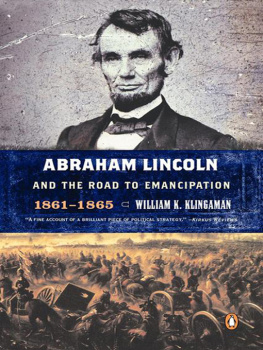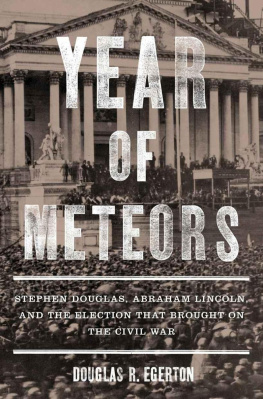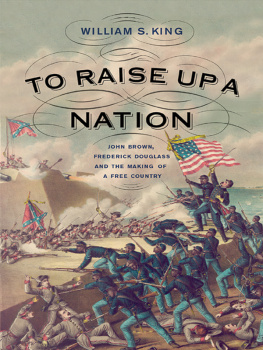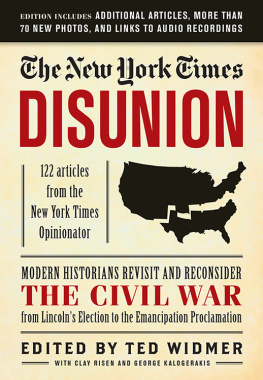The Road to Disunion
Secessionists Triumphant 18541861
By William W. Freehling
Prelude to Civil War: The Nullification Controversy in South Carolina, 18161836
Willie Lee Rose, Slavery and Freedom (Editor)
Secession Debated: Georgias Showdown in 1860 (Editor, with Craig M. Simpson)
The Reintegration of American History: Slavery and the Civil War
The South vs. The South: How Anti-Confederate Southerners Shaped the Course of the Civil War
THE ROAD TO DISUNION
Volume I: Secessionists at Bay, 17761854
Volume II: Secessionists Triumphant, 18541861
The Road to Disunion
VOLUME II
Secessionists Triumphant 18541861
WILLIAM W. FREEHLING


Oxford University Press, Inc., publishes works that further
Oxford Universitys objective of excellence
in research, scholarship, and education.
Oxford New York
Auckland Cape Town Dar es Salaam Hong Kong Karachi
Kuala Lumpur Madrid Melbourne Mexico City Nairobi
New Delhi Shanghai Taipei Toronto
With offices in
Argentina Austria Brazil Chile Czech Republic France Greece
Guatemala Hungary Italy Japan Poland Portugal Singapore
South Korea Switzerland Thailand Turkey Ukraine Vietnam
Copyright 2007 by William W. Freehling
Published by Oxford University Press, Inc.
198 Madison Avenue, New York, NY 10016
www.oup.com
ISBN 978-0-19-505815-4
Oxford is a registered trademark of Oxford University Press
All rights reserved. No part of this publication may be reproduced,
stored in a retrieval system, or transmitted, in any form or by any means,
electronic, mechanical, photocopying, recording, or otherwise,
without the prior permission of Oxford University Press.
The Library of Congress has catalogued Volume I as follows:
Freehling, William W., 1935
The road to disunion / William W. Freehling
p. cm.
Contents: v. 1. Secessionists at bay, 17761854
ISBN 0-19-505814-3 (v. 1)
1. United StatesHistoryCivil War, 18611865Causes
2. Secession. 3. Southern StatesPolitics and
government17751865. 4. United StatesPolitics and
government18151861. I. Title.
E468.9.F84 1990
973.711dc20 89-26511 CIP
1 3 5 7 9 8 6 4 2
Printed in the United States of America
on acid-free paper
Again and again
for
Alison
and in memory
of
Sheldon Meyer
Contents
Coda: Did the Coincidence Change History?
Coda: Did Stephenss and Hammonds Personalities Change History?
Coda: How Did Slavery Cause the Civil War?
Preface
In this second and concluding volume of my southern Road to Disunion, Northerners sometimes step front and center, to illuminate provokers, targets, and effects of southern defenders rage. But by usually focusing on aggressively defensive Southerners, I seek to resurrect their preCivil War political saga, one of Americas most important and mysterious epics.
The importance lies in the illumination of colliding democratic and despotic governing systems. The Old South combined dictatorship over blacks with republicanism for whites, supposedly cleanly severed by an All-Mighty Color Line. But to preserve dictatorial dominion over blacks, the slaveholding minority sometimes trenched on majoritarian government for whites, in the nation as well as in their section.
These preventative strikes leached much of the mystery from Yankees antisouthern responses. Northerners called the militant slavocracy the Slave Power, meaning that those with autocratic power over blacks also deployed undemocratic power over whites. Most Yankees hardly embraced blacks or abolitionists. Yet racist Northerners would fight the Slave Power to the death to preserve their white mens majoritarian rights. More mysterious is why Southerners risked a potentially suicidal rebellion against Northerners who disclaimed any intention of forcing abolition on southern states.
My explanation emphasizes that problems inside southern culture nurtured both fury at any outside criticism and determination to prevent antislavery democratic discourse from seeping anywhere near despots doors. The internal travail and its external consequences become clearest in widest perspective. Thus my first volume of Road, published a decade and a half ago, traced the democratic-despotic sections political traumas from the American Revolution through the 1854 passage of the Kansas-Nebraska Act. This sequel moves from that laws bloody Kansas aftermath to the Civil Wars first blood. As the war nears, my narrative slows, to detail the spectacles that started with John Browns raid and ended with Fort Sumters surrender. My
In this book, as in The South vs. The South and as in my previous Road volume, widening southern divisions between regions, races, and classes frustrated attempts to forge a single civilization. To bridge potentially corrosive differences, late antebellum Southerners deployed ever more intriguing proslavery ideologies and ever more zany political crusades. Because these initiatives failed, the secessionist faction of white Southerners considered President-elect Lincoln an immediate menace to their imperfectly consolidated regime. Most Southerners at first retorted that secessionists exaggerated the immediate threat and rushed to revolution prematurely. Yet disunionists strained, struggled, and ultimately secured a southern majority, not least to preclude any Republican Party attempt for a majority inside the most exposed southern states.
The minority of the minoritys stretch illuminated the tension that exists between majority will and minority power whenever democracy existsand the deeper difficulty of a democratic resolution when a despotic social institution thrives. A wider understanding of why our peaceful democratic processes failed at home may temper overconfidence that American republicanism will always work abroad. Furthermore, slaveholders intolerance for contrary opinion devastated our House Divided; and a broader awareness of that historical lesson may spare democracies from some cries that disagreement proves disloyalty.
Once again in this volume, I resist academics tendency to maximize multicultural social history and to minimize mainstream political history. Four million blacks emancipation, for example, a central social history event, becomes unintelligible without establishment white males political (and military) history. Instead of dismissing mainstream political history, social history must deeply inform it. Thus the nature of masters dictatorship over blacks compelled their partial closure of republicanism for whites. Furthermore, the nature of slaves resistances propelled their uninvited (and important) intrusions into white mens political upheavals.
I here also resist academic historians tendency to maximize abstract analysis and to minimize dramatic writing. I write stories about striking individuals and fetching places for deeper reasons than to make history intelligible beyond the academy (although historical lessons are too important to be restricted to fellow professors). Where many academic historians dismiss epic stories as old-fashioned fluff, I believe that classic tales of headline events, when retold from fresh angles, help sort out the cultures underlying forces.
To take a prime example from the following narrative, a current historical wisdom alleges that southern planters thought they needed fresh land in new U.S. territories to endure economically. Thus the slavocracy supposedly rose in revolution against President-elect Lincolns threatened containment of Slave Power territorial expansions. Some parts of that abstraction illuminate some of the disunionists, some of the time (and many mainstream southern political leaders, before secessionist times).
Next page









